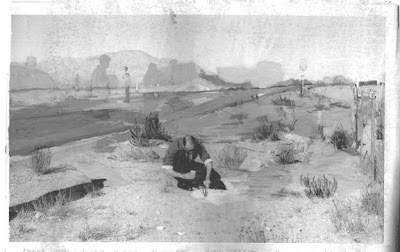 provincial:
provincial: a person of local or restricted interests or outlook b: a person lacking urban polish or refinement
at a
kkprojects opening event during new orleans' first biennial I had an intense conversation with an art professional who lives between berlin and new york city. while he enjoyed several $7 cocktails composed of aged vinnegar, champagne and some other herbal specialties, he espoused how atlanta will never have an art scene because of it's provincialism.
at first, I listened and agreed. atlanta (where I live) is a very conservative, small town for an urban population of nearly 5 million. it's a cultural suburb (with real strip malls, parking lots and sprawl), whose main concern is corporate business. however, our social elite wish to be ranked with other national fine art clubs and thus support conventional "arts." there's a small wild music scene (centered around celebrity low-browsers
deerhunter & the
blacklips). but, as far as art goes, the ATL receives second-hand artistic franchises, authority figures and hits from other places with submissive excitement. the high is our greatest museum, architecturally. it's a wonderful white whale of a building designed by richard meier and filled with fluffy populace programming for women with strollers, busloads of students and the genteel, looking for light afternoon entertainment. they are herded in and their ears are stuffed with the voices of electronic guides. I have witnessed it all too many times: the interior galleries of the main shows, filled with lines of single filed visitors, shuffling silently clockwise along the walls.
even the most highly regarded commercial art galleries here (
Saltworks,
Get This!,
Whitespace,
Marcia Wood,
Solomon Projects), must go elsewhere to receive creditation, get inspired and make money. if you want to go to core artistic sources of our times, see experiments, deviations from norms and new daring developments, you'll need to hop on a plane or lurk online. and if you practice art here, you'll need to comply gracefully with these values and your place in the world as a lesser practitioner. . .or develop an inflated, uninformed sense of self worth, rejecting the locals' fear and judgement at anything that doesn't imitate these accepted mainstream norms. a strange kind of provincialism, indeed. this is a provencialism that focuses not on local indigenous culture, but instead limits itself to a gentler version of other urban cultural standards.
so is the fate of being in a submissive cultural city in a time of globalization.
but, then I began to disagree with that art professional quite a lot . not only did he condescend to atlanta, but he also condescended to new orleans "locals," as well. I could agree about atlanta, but new orleans?. . .it has one of the most original independent cultures in this country. like any outsider art culture, there might be some clueless, distracted, lazy or just plain disappointing art practitioners there. . . but I'd dare say, that as a contemporary context for artistic practice, new orleans is one of the few places right now that still has the spirit to sustain a dynamic art movement like what happened in crusty, edgy, abandoned soho of the 50s. it became apparent to me that this art professional knew it. he was hunting for the next untapped art place to colonize and domesticate.
the thing is. . .unlike ATL, new orleans cannot be tamed. that is what makes this southern, provincial development, a most precious locale. my friend
john otte (artist & lover of new orleans) says, the swamp will always win. the
tropicalistas put it another way. . .they saw their jungle culture accept european modernism, a global thirst in the 60s. their philosophical response was to become cannibals. the jungle and its people would eat everything (all in-coming new cultures) and survive as a unique hybrid and not an obedient colony culture. so. . .with great hope, I am watching new orleans and do intend to participate in it at this fertile time.
so there is a conundrum to the values of being local. in environmental terms it's a positive. grow your own vegetables, walk and bike around your daily routine, understand your local politics, beliefs, practices, history, architecture, weather patterns, etc. and when you focus on this, you start to understand the unique character of your place and how to thrive in it, how to build on it. we cannot forget the finite physical place that a single human being can touch for real. but this approach of localism is at odds with the idea and ambition of globalization. there's the term glocal. which is the hybrid of the two values. . .but there are still very strong pejoratives associated with being a "local."
it's essential at this time to look out there at the globe, try to be aware of powerful cultural monocultures via technological means, try to understand your relationship with it. this does not mean everyone must strictly align with dominant global culture without resistance, without pockets of strong localisms. . . perhaps in time we will resusitate that bad word "provincialism" and twist it into naughty gold.
there's a practical, economical aspect to localism / provincialism. to travel and be culturally global, takes a lot of resources (money, time & control). those who are economically challenged, cannot really be globally active, for they must stay in one place to work and take care of the mundanities. but such local people pretend non-the-less to be part of the global community by following the trends promoted to them via various media channels. will skepticism and resistence to this media-maintained monoculture always connote naivete, ignorance, ludditity. . .poverty?





